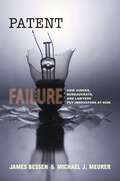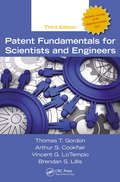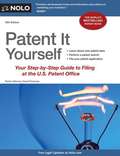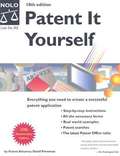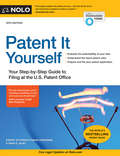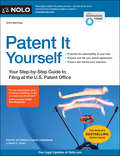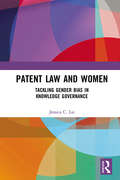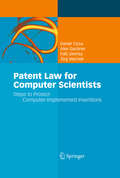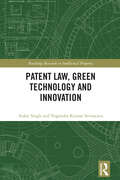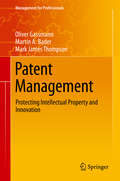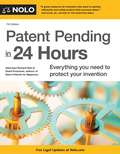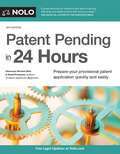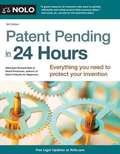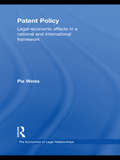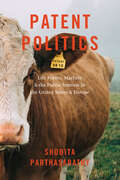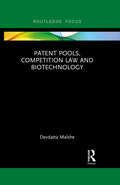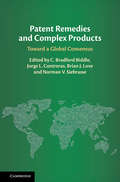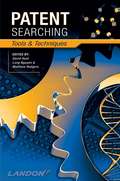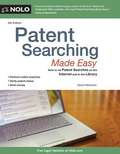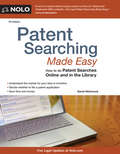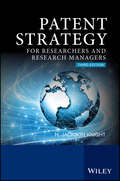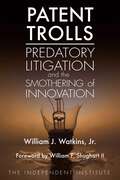- Table View
- List View
Patent Failure: How Judges, Bureaucrats, and Lawyers Put Innovators at Risk
by James Bessen Michael J. MeurerIn recent years, business leaders, policymakers, and inventors have complained to the media and to Congress that today's patent system stifles innovation instead of fostering it. But like the infamous patent on the peanut butter and jelly sandwich, much of the cited evidence about the patent system is pure anecdote--making realistic policy formation difficult. Is the patent system fundamentally broken, or can it be fixed with a few modest reforms? Moving beyond rhetoric, Patent Failure provides the first authoritative and comprehensive look at the economic performance of patents in forty years. James Bessen and Michael Meurer ask whether patents work well as property rights, and, if not, what institutional and legal reforms are necessary to make the patent system more effective. Patent Failure presents a wide range of empirical evidence from history, law, and economics. The book's findings are stark and conclusive. While patents do provide incentives to invest in research, development, and commercialization, for most businesses today, patents fail to provide predictable property rights. Instead, they produce costly disputes and excessive litigation that outweigh positive incentives. Only in some sectors, such as the pharmaceutical industry, do patents act as advertised, with their benefits outweighing the related costs. By showing how the patent system has fallen short in providing predictable legal boundaries, Patent Failure serves as a call for change in institutions and laws. There are no simple solutions, but Bessen and Meurer's reform proposals need to be heard. The health and competitiveness of the nation's economy depend on it.
Patent Fundamentals for Scientists and Engineers
by Thomas T. Gordon Arthur S. Cookfair Vincent G. LoTempio Brendan S. LillisThe most significant overhaul of the U.S. patent laws in decades occurred with the recent passage of the Leahy-Smith America Invents Act (AIA). Understanding the law that dictates what a patent is and how a patent is obtained and enforced, and the recent changes through statute or case law litigation presents unique challenges. This third edition o
Patent It Yourself
by David Pressman AttorneyPatent your creation with the world's bestselling guide to patents! Have a world-class idea? Ready to protect your invention from copycats? Then turn to the best resource available -- Patent It Yourself. Attorney David Pressman takes you through the entire patent process, providing scrupulously updated information and clear instructions to help you: determine if you can patent your invention understand patent law evaluate the commercial potential of your idea perform your own patent search file a provisional patent application prepare a formal patent application respond to patent examiners amend an application enforce and maintain your patent market and license your invention Thoroughly updated to reflect the latest changes in intellectual property law, this edition provides the latest U.S. Patent and Trademark Office rules and forms. It includes up-to-date discussions of the new "first to file" rule, which promises to revolutionize patent law. Whether you're new at the inventing game or a grizzled veteran, Patent It Yourself will save you grief, time and money.
Patent It Yourself
by David Pressman Attorney Thomas J. TuytschaeversAttorney David Pressman and updater Thomas Tuytschaevers takes you through the entire patent process, providing scrupulously updated information and clear instructions to help you: determine if you can patent your invention understand patent law evaluate the commercial potential of your idea perform your own patent search file a provisional patent application prepare a formal patent application respond to patent examiners amend an application enforce and maintain your patent market and license your invention Thoroughly updated to reflect the latest changes in intellectual property law, this edition provides the latest U.S. Patent and Trademark Office rules and forms. It includes up-to-date discussions of the new "first to file" rule, which has to revolutionized patent law.
Patent It Yourself (10th edition)
by David PressmanPressman, a patent attorney and inventor, offers a guide to the patent process. He explains what patents and other intellectual property are, each step in the process of obtaining a US patent, how and when to file an application, how to document an invention, and requirements and procedures abroad, and provides reproducible and downloadable forms. He also discusses alternative and supplementary forms of protection, such as trade secrets, copyrights, trademarks, and unfair competition law, as well as how to commercially evaluate, market, and license an invention. This edition includes the latest US Patent and Trademark Office rules and forms and covers electronic filing, combination inventions, and other changes to technical filing rules. It covers recent court cases, termination of the PTO's Document Disclosure Program, the lack of patentability of transitory electronic signals, free patent searching systems, new forms, claiming copyright in a specification or drawing, new rules regarding claims limitations and continuation applications.
Patent It Yourself: Your Step-by-Step Guide to Filing at the U.S. Patent Office
by David Pressman David E. BlauFor 30 years, Patent It Yourself has guided hundreds of thousands of inventors through the process of getting a patent, from start to finish. Patent attorneys David Pressman and Thomas J. Tuytschaevers provide the latest information, forms, and clear instructions to help you: conduct a patent search the right way evaluate your idea’s commercial potential file a provisional patent application to get “patent pending” status prepare a patent application focus on your patent application’s claims respond to patent examiners get your drawings done right protect your rights in foreign countries deal with infringers, and market and license your invention. Thoroughly updated to reflect the latest changes in intellectual property law, this edition provides the latest U.S. Patent and Trademark Office rules and forms. The 18th edition covers the latest implications of the first-to-file rules created by the America Invents Act.
Patent It Yourself: Your Step-by-Step Guide to Filing at the U.S. Patent Office
by David Pressman David E. BlauProtect and profit from your invention For 35 years, Patent It Yourself has guided hundreds of thousands of inventors through the process of getting a patent, from start to finish. Patent attorneys David Pressman and David E. Blau provide the latest information, forms, and clear instructions to help you: conduct a patent search the right way evaluate your idea’s commercial potential file a provisional patent application to get “patent pending” status prepare a patent application focus on your patent application’s claims respond to patent examiners get your drawings done right protect your rights in foreign countries deal with infringers, and market and license your invention. The 20th edition covers the latest patent filing rule changes, including the most recent implications of the America Invents Act first-to-file rules. With downloadable forms: All essential forms, including a Nondisclosure Agreement, Patent Searcher’s Worksheet, and Design Patent Application are included in the book and are available for download (details inside).
Patent It Yourself: Your Step-by-Step Guide to Filing at the U.S. Patent Office
by David Pressman Thomas TuytschaeversAttorney David Pressman and updater Thomas Tuytschaevers take you through the entire patent process, providing scrupulously updated information and clear instructions to help you: determine if you can patent your invention understand patent law evaluate the commercial potential of your idea perform your own patent search file a provisional patent application prepare a formal patent application respond to patent examiners amend an application enforce and maintain your patent market and license your invention Thoroughly updated to reflect the latest changes in intellectual property law, this edition provides the latest U.S. Patent and Trademark Office rules and forms. It includes up-to-date discussions of the new "first to file" rule, which has to revolutionized patent law.
Patent Law and Women: Tackling Gender Bias in Knowledge Governance
by Jessica C. LaiThis book analyses the gendered nature of patent law and the knowledge governance system it supports. The vast majority of patented inventions are attributed to male inventors. While this has resulted in arguments that there are not enough women working in science, technology, engineering and mathematics, this book maintains that the issue lies with the very nature of patent law and how it governs knowledge. The reason why fewer women patent than men is that patent law and the knowledge governance system it supports are gendered. This book deconstructs patent law to reveal the multiple gendered binaries it embodies, and how these in turn reflect gendered understandings of what constitutes science and an invention, and a scientist and an inventor. Revealing the inherent biases of the patent system, as well as its reliance on an idea of the public domain, the book argues that an egalitarian knowledge governance system must go beyond socialised binaries to better govern knowledge creation, dissemination and maintenance. This book will appeal to scholars and policymakers in the field of patent law, as well as those in law and other disciplines with interests in law, gender and technology.
Patent Law for Computer Scientists
by Jörg Machek Daniel Closa Alex Gardiner Falk GiemsaPatent laws are different in many countries, and inventors are sometimes at a loss to understand which basic requirements should be satisfied if an invention is to be granted a patent. This is particularly true for inventions implemented on a computer. While roughly a third of all applications (and granted patents) relate, in one way or another, to a computer, applications where the innovation mainly resides in software or in a business method are treated differently by the major patent offices in the US (USPTO), Japan (JPO), and Europe (EPO). The authors start with a thorough introduction into patent laws and practices, as well as in related intellectual property rights, which also explains the procedures at the USPTO, JPO and EPO and, in particular, the peculiarities in the treatment of applications centering on software or computers. Based on this theoretical description, next they present in a very structured way a huge set of case studies from different areas like business methods, databases, graphical user interfaces, digital rights management, and many more. Each set starts with a rather short description and claim of the "invention", then explains the arguments a legal examiner will probably have, and eventually refines the description step by step, until all the reservations are resolved. All of these case studies are based on real-world examples, and will thus give an inexperienced developer an idea about the required level of detail and description he will have to provide. Together, Closa, Gardiner, Giemsa and Machek have more than 70 years experience in the patent business. With their academic background in physics, electronic engineering, and computer science, they know about both the legal and the subject-based subtleties of computer-based inventions. With this book, they provide a guide to a patent examiner's way of thinking in a clear and systematic manner, helping to prepare the first steps towards a successful patent application.
Patent Law, Green Technology and Innovation (Routledge Research in Intellectual Property)
by Ankit Singh Yogendra Kumar SrivastavaIn the era of modern industrial regimes, the role of technology in tackling climate change is pivotal. International goals of climate change mitigation and sustainable development cannot be achieved without the contribution of new technologies. At the same time, the importance of patent protection and an efficient patent system that facilitates technology transfer among international frontiers cannot be overlooked. Many patented technologies are either not accessible for further dissemination or do not hold much technical value. Therefore, advanced systems of collaborative innovation have been developed, especially in the sector of green technology and green innovation. The environmental concerns of the global community cannot be tackled by a single company, person, sector or country. Innovation partnerships and collaborative research will play a vital role in combating global climate concerns and in determining the diffusion of green technologies for maximum impact. This book argues that policy-makers should encourage partnerships in technology rather than focusing on gaining investment and access to green technology to encourage global technological giants to transfer their technology and knowledge to local entities. It analyses the relationship between patent protection, green innovation and diffusion of green technology against the backdrop of climate change and severe climate crisis. Taking an interdisciplinary approach to align patent law and green technology with the Sustainable Development Goals, it examines the effects of patent protection, technology transfer and compulsory licensing on the diffusion of green technologies it offering a systematic analysis of the relationship between patent protection, green innovation and diffusion of green technology from a global perspective.
Patent Management: Protecting Intellectual Property and Innovation (Management for Professionals)
by Oliver Gassmann Martin A. Bader Mark James ThompsonThis book provides an overview of the common concepts and building blocks of patent management. It addresses executives in the areas of innovation, R & D, patent and intellectual property management as well as academics and students.The authors give valuable information on the characteristics of patent and intellectual property management, based on the collaboration with companies and organizations from Europe, China, Japan, Argentina, Brazil, India, Canada and the US.A reference for managers who want to bring information technology innovation with a clear intellectual property strategy to the market. A very readable book. Thomas Landolt, Managing Director, IBMA really comprehensive, all-in book about Patents – strategy, value, management and commercialization. And not forgetting what they are for – foster innovation.Dr. Joerg Thomaier, Head of IP Bayer Group
Patent Markets in the Global Knowledge Economy
by Thierry Madiès Thierry Madiès Dominique Guellec Jean-Claude Prager Dominique GuellecThe development of patent markets should allow for better circulation of knowledge and more efficient allocation of technologies at a global level. However, the beneficial role of patents has recently come under scrutiny by those favouring 'open' innovation, and important questions have been asked, namely: How can we estimate the value of patents? How do we ensure matching between supply and demand for such specific goods? Can these markets be competitive? Can we create a financial market for intellectual property rights? In this edited book, a team of authors addresses these key questions to bring readers up to date with current debates about the role of patents in a global economy. They draw on recent developments in economic analysis but also ground the discussion with the basics of patent and knowledge economics. Striking a balance between institutional analysis, theory and empirical evidence, the book will appeal to a broad readership of academics, students and practitioners.
Patent Pending in 24 Hours
by Richard Stim David PresmanEverything you need to protect your invention now The provisional patent application (PPA) is a quick, inexpensive and legal way to claim your invention--and buy yourself time to determine whether it's worthwhile to pursue a regular patent. Learn how to: conduct a patent search online complete all the necessary forms evaluate potential hurdles prepare informal drawings file your application, and file a new PPA to reflect modifications. The book also includes important legal forms to help you preserve your rights when showing or selling your invention: nondisclosure agreement patent assignment prototype-maker agreement joint-ownership agreement The 7th edition incorporates changes from the "America Invents Act," as well as recent revisions to patent rules and regulations. Thousands of people have used Patent Pending in 24 Hours successfully. You can, too!
Patent Pending in 24 Hours
by Richard Stim David PresmanEverything you need to protect your invention now Ready to stamp "patent pending" on your invention? Then you need to file a provisional patent application (PPA), an inexpensive way to claim your invention - and buy yourself time to determine whether it's worthwhile to pursue a regular patent. With Patent Pending in 24 Hours, you will learn how to: conduct a patent search online complete all the necessary forms evaluate potential hurdles prepare informal drawings file your application, and file a new PPA to reflect modifications The new edition covers the latest implications of recent federal patent law reform for PPA applicants.
Patent Pending in 24 Hours
by Richard StimTake the first step to protecting your invention! Ready to stamp "patent pending" on your invention? Then you need to file a provisional patent application (PPA), an inexpensive way to claim your hard work. With a PPA, you'll have time to figure out whether you can make a profit from your creation before you invest more time and money. With Patent Pending in 24 Hours, you have all the forms and information you need to get the job done! Find out how to: . evaluate hurdles to patentability . write a clear PPA . prepare informal drawings of your invention . conduct a patent search online . understand basic patent law . complete all forms required by the U.S. Patent and Trademark Office . file your application . modify your invention after filing The book also includes important legal forms to help you preserve your rights when showing or selling your invention: . nondisclosure agreement . patent assignment . prototype-maker agreement . joint-ownership agreement This edition is completely revised with updated case law and patent regulations, updated patent searching information and additional resources. The first book to cover huge legislative changes to American patent law, taking effect throughout 2012 and 2013
Patent Policy: Legal-Economic Effects in a National and International Framework (The\economics Of Legal Relationships Ser.)
by Pia WeissIntellectual property rights have become increasingly important for our modern economies in recent years. Although the entire patent system has a profound effect on the decision of firms of whether to conduct research and at which volume, patent law is the heart of the entire patent system. Therefore, this book focuses on the economic effects of certain provisions in patent law by using economic models dedicated to patent policy. The first part of the book presents a brief overview over the history of patent systems and introduces the main components of modern patent systems. A short introduction of the principal provisions of US patent law constitutes the centre of the subsequent analysis as it serves as a link between law and economics. The second part presents core economic models for central provisions, collecting the most fundamental results in a national framework in the field of literature. Part three is concerned with selected provisions of patent law in an international framework. It provides valuable insights into the situation of developing countries which are the chief recipients of technology transfers. Patent Policy will be of interest to researchers interested in the field of modelling patent policy. It can be also used as supplementary text in courses in Industrial Organization, Innovation Economics and Law and Economics.
Patent Politics: Life Forms, Markets, and the Public Interest in the United States and Europe
by Shobita ParthasarathyOver the past thirty years, the world’s patent systems have experienced pressure from civil society like never before. From farmers to patient advocates, new voices are arguing that patents impact public health, economic inequality, morality—and democracy. These challenges, to domains that we usually consider technical and legal, may seem surprising. But in Patent Politics, Shobita Parthasarathy argues that patent systems have always been deeply political and social. To demonstrate this, Parthasarathy takes readers through a particularly fierce and prolonged set of controversies over patents on life forms linked to important advances in biology and agriculture and potentially life-saving medicines. Comparing battles over patents on animals, human embryonic stem cells, human genes, and plants in the United States and Europe, she shows how political culture, ideology, and history shape patent system politics. Clashes over whose voices and which values matter in the patent system, as well as what counts as knowledge and whose expertise is important, look quite different in these two places. And through these debates, the United States and Europe are developing very different approaches to patent and innovation governance. Not just the first comprehensive look at the controversies swirling around biotechnology patents, Patent Politics is also the first in-depth analysis of the political underpinnings and implications of modern patent systems, and provides a timely analysis of how we can reform these systems around the world to maximize the public interest.
Patent Pools, Competition Law and Biotechnology (Routledge Research in Intellectual Property)
by Devdatta MalsheExploring the relationship between competition law and technology pools, this book provides general-purpose details of the biotechnology patent pool scheme while discussing historical developments, approaches of the US Department of Justice, Federal Trade Commission, and the European Union Competition Commission via EU regulations. In addition to these regulatory approaches and evolution in concept and theory of technology pools, this book illustrates relationship issues including tying arrangements and essential facility consideration vis-à-vis technology pools. It analyzes the modalities of forming such pools in the area of biotechnology, specifically illustrating that the formation of technology pools is possible and can be safely undertaken, and proposes a viable solution and structure. Patent pools in the biotechnology industry will pave the way towards open collaborative research, reducing patent thickets. Formation of such pools will increase access to various technology and patents otherwise out of bounds, resulting in a reduction of licensing costs and a spur in the development of new solutions. Most importantly, such pools will reduce the frequency of patent toll gates, making the entire spectrum of research interesting from the perspective of researchers as well as investors. This book will be an aid to researchers studying intellectual property, patents, and biotechnology, as well as to interest groups including funding agencies, venture funds, angel investors, and proponents of the open-source movement.
Patent Remedies and Complex Products: Toward a Global Consensus
by Jorge L. Contreras C. Bradford Biddle Brian J. Love Norman V. SiebrasseThrough a collaboration among twenty legal scholars from eleven countries in North America, Europe and Asia, Patent Remedies and Complex Products presents an international consensus on the use of patent remedies for complex products such as smartphones, computer networks and the Internet of Things. It covers the application of both monetary remedies like reasonable royalties, lost profits, and enhanced damages, as well as injunctive relief. Readers will also learn about the effect of competition laws and agreements to license standards-essential patents on terms that are 'fair, reasonable and non-discriminatory' (FRAND) on patent remedies. Where national values and policy make consensus difficult, contributors discuss the nature and direction of further research required to resolve disagreements. This title is also available as Open Access on Cambridge Core.
Patent Searching
by David Hunt Matthew Rodgers Long NguyenWhether you're a patent examiner, patent attorney, commercial patent searcher, patent liaison, IP librarian, law professor, or competitive intelligence analyst, you'll find Patent Searching: Tools and Techniques to be just the guide you have been waiting for, with a range of approaches to patent searching that will be useful to you regardless of your technical expertise or role in the intellectual property community.
Patent Searching Made Easy
by David HitchcockIn the past, if you wanted to assess the novelty of an idea, you had to wade through the patent database at the U.S. Patent and Trademark Office (PTO) in Virginia or hire a lawyer to do a patent search for $500 and up. The cost and inconvenience of these searches often meant that good ideas were left to rot on the vine. Patent Searching Made Easy shows you how do patent searches yourself, on the Internet, at little or no cost. Plus, you'll learn how to: . verify the patent status of an idea . prepare for online searches with the right hardware, software and computer skills . access online patent searching resources . narrow online searches with keywords and Boolean logic . perform database searches at Patent and Trademark Resource Centers (PTRC) . do prior art searches at PTRC . search fee based patent databases on the Internet . search international patent offices . do advanced searches at the PTO and PTRC Written for both inventors and business owners interested in expanding their product line through the license, distribution or manufacture of other people's ideas, Patent Searching Made Easy is the easiest way for you to determine the answer to that all important question, "Am I the first?" A physicist, engineer, and patent searching expert, author David Hitchcock gives you the vocabulary, instructions and strategies you need to search for a patent quickly and easily. He explains how the PTO classifies different types of inventions, so that you can assign your idea to the right class, compare it to related ideas and then determine if it's novel enough to qualify for a patent.
Patent Searching Made Easy: How to do Patent Searches Online and in the Library
by David HitchcockInventor? Find out if you're the first to file a patent, online and in the library In the past, if you wanted to assess the novelty of an idea, you had to wade through the patent database at the U.S. Patent and Trademark Office (PTO) in Virginia -- or hire a lawyer to do a patent search for $500 and up. The cost and inconvenience of these searches often meant that good ideas were left to rot on the vine. In Patent Searching Made Easy, find the plain-English information you need to: verify the patent status of an idea search Patent and Trademark Depository Libraries use online patent search services A physicist, engineer, and patent searching expert, author David Hitchcock gives you the vocabulary, instructions and strategies you need to search for a patent quickly and easily. He explains how the PTO classifies different types of inventions, so that you can assign your idea to the right class, compare it to related ideas, and then determine if it's novel enough to qualify for a patent. Patent Searching Made Easy shows you how do patent searches yourself, on the Internet, at little or no cost. Plus, you'll learn how to: prepare for online searches with the right hardware, software and computer skills access online patent searching resources narrow online searches with keywords and Boolean logic perform database searches at Patent and Trademark Depository Libraries (PTDLs) do microfiche searches at PTDLs search fee-based patent databases on the Internet search international patent offices, and do advanced searches at the PTO and PTDL. Written for both inventors and business owners interested in expanding their product line through the license, distribution or manufacture of other people's ideas, Patent Searching Made Easy is the easiest way for you to determine the answer to that all-important question, "Am I the first?"
Patent Strategy for Researchers and Research Managers
by H. Jackson KnightAs individuals and companies realise the importance of their inventions, issues surrounding patent laws and practices are taking centre stage around the world.Patent Strategy introduces researchers to patent applications and patent portfolios. With minimum use of 'legal jargon' it provides the technical professional with the assistance and advice they require to understand the legal complexities that they may encounter before and during a patent application. It also discusses the responsibilities of the researcher after patent applications have been filed and the role the researcher can play in the maintenance of a global patent estate.This updated edition of the best selling book has been expanded to keep pace with modern day movements and addresses the global issue surrounding intellectual property. Including new information on areas such as software and biotechnology it shows the techniques that can be used by individuals and academic inventors to protect their work and is the ideal reference source.Bridges the gap between the legal system and scientific research and avoids legal jargonDetails the reasons behind patents, their importance and relevance to all researchers and the strategy needed for filing for a patentFocuses on the strategy and reasons rather than just being a textbook of patent lawPresents an overview of tools a researcher can use while working with a patent attorney or agentAdopts a readable style that explains the basics right up to developing a strategyEssential reading for all those who wish to keep pace and protect their workReviews from previous edition:"...I can recommend it for technology managing types. Does a nice job of explaining many aspects of the patent system and patent strategies with a minimum of jargon and case citations..."--Internet Patent News"...provides an enlightened approach to a complex subject. It is relatively easy to read and follow..."-- Polymers Paint and Colour Journal"This handy book provides the researcher with useful guidance on how to maximize the benefit of their inventiveness to themselves and their organization".--Journal of Chemical Technology and Biotechnology
Patent Trolls: Predatory Litigation and the Smothering of Innovation
by William J. Watkins Jr.Patent trolls are stifling innovation.Using overbroad patents based on dated technology, trolls threaten litigation and bring infringement suits against inventors. Trolls, also known as Non-Practicing Entities (&“NPEs&”), typically do not produce products or services, but are in the business of litigation. They lie in wait for someone to create a process or product that has some relationship to the patent held by the troll, and then they pounce with threats and lawsuits. The cost to the economy is staggering. Watkins calls attention to this problem and the challenges it poses to maintaining a robust rate of technologically progress. He also examines a more fundamental problem: an outmoded patent system that is fundamentally ill suited for the modern economy. Finally, he examines proposals for reforming the patent system.
